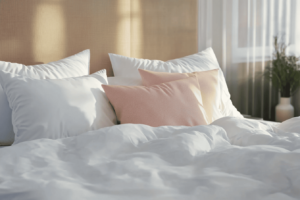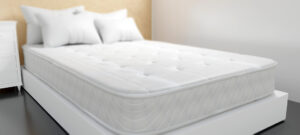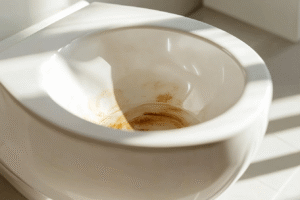How often should you wash your bed sheets? It’s one of those tasks that easily slips down the to-do list when life gets busy. Yet, keeping up with this simple habit can work wonders for your health, sleep quality, and even your overall mood. Believe it or not, clean sheets aren’t just about aesthetics—they’re a foundation for better living. Let’s dive into the world of bed hygiene, uncover why it matters, and show you how to make your weekly cleaning routine a quick and rewarding ritual you’ll actually look forward to!

How often should you wash your bed sheets?
Here’s the golden rule: wash your sheets once a week. If you live in a hot climate, sweat heavily, or sleep with pets, consider washing them every 3-4 days. Got allergies? Weekly washes at a high temperature (at least 60°C) are your best bet for staying sneeze-free.
Importance of cleaning your bed sheets
Clean sheets are about more than just that fresh, crisp feeling (though we love that too)—they’re essential for health and hygiene. Wondering how often should you wash your bed sheets? Here’s why it matters:
Dust mites prevention
Dust mites are microscopic creatures that feed on dead skin cells. Gross, but true. They’re a leading cause of allergies, triggering symptoms like sneezing, watery eyes, and even breathing difficulties. Regular washing keeps their population under control and ensures you can breathe easy in bed.
Fungal and bacterial growth
Bacteria and fungi can accumulate in your sheets over time, especially if you’re prone to night sweats or sleep in humid conditions. Studies have shown that unwashed bedding can harbour harmful microbes, increasing the risk of infections. Washing your sheets often not only feels good—it’s good for your health too.
Skin health and breakouts
Ever wondered why your skin sometimes breaks out for no reason? It might be your bed sheets! Dirty sheets can clog pores and exacerbate conditions like acne. Fresh linens are a simple (and luxurious) way to keep your skin glowing.
Choosing the right material for your sheets
The fabric you sleep on can make a huge difference in comfort and care. Let’s explore two popular options:
Egyptian Cotton: The Ultimate Bedding Luxury
Egyptian cotton is often hailed as the gold standard of bedding materials, and it’s not hard to see why. Known for its long, fine fibres, Egyptian cotton creates a fabric that is smoother, softer, and more durable than regular cotton. The longer fibres also mean fewer breaks in the weave, resulting in sheets that resist pilling and wear over time. This quality makes Egyptian cotton a long-term investment in comfort and luxury.
Benefits of Egyptian Cotton Sheets
- Softness and Comfort: Egyptian cotton sheets only get softer with each wash, offering unmatched comfort that improves over time. It’s like sleeping in a cloud, night after night.
- Breathability: Thanks to its natural fibres, Egyptian cotton is incredibly breathable, keeping you cool in summer and warm in winter. No more tossing and turning due to overheating!
- Durability: High-quality Egyptian cotton sheets can last for years if cared for properly, making them worth the investment.
Caring for Egyptian Cotton
To keep your Egyptian cotton sheets in pristine condition, follow these care tips:
- Washing: Always wash in cold or lukewarm water with a gentle detergent. Hot water can weaken the fibres over time, reducing the lifespan of your sheets.
- Drying: Avoid high heat when drying. Tumble dry on a low setting or, even better, line dry them to preserve their texture and integrity.
- Ironing: If you prefer wrinkle-free bedding, iron your sheets on a medium setting while they’re slightly damp. This helps maintain that crisp, hotel-style look.
Linen Sheets: A Timeless and Practical Choice
Linen sheets are experiencing a well-deserved renaissance, and it’s easy to see why they’re such a beloved choice for bedding. Made from the fibres of the flax plant, linen has been used for centuries, and it remains a go-to material for those who value comfort, durability, and sustainability. Perfect for all seasons but particularly brilliant in warmer weather, linen sheets are a blend of style, practicality, and timeless appeal.
Why Choose Linen Sheets?
- Lightweight and Breathable: Linen is naturally lightweight and breathable, making it perfect for warm sleepers or hot climates. Its unique weave allows air to flow freely, keeping you cool and comfortable throughout the night.
- Naturally Antibacterial: Linen has natural antibacterial and antifungal properties, which makes it ideal for people with allergies or sensitive skin. It’s also less likely to harbour odours, even after extended use.
- Durability: Linen is incredibly strong, often lasting decades with proper care. Unlike some other fabrics, it becomes softer and more comfortable the more you wash and use it.
Caring for Linen Sheets
To make the most of your linen bedding, proper care is essential. Here’s how to keep it looking (and feeling) fabulous:
- Washing: Always wash linen sheets in cold water on a gentle cycle. Harsh detergents or hot water can weaken the fibres and cause shrinkage. Using a detergent specifically designed for delicate fabrics is an added plus.
- Drying: Air-drying is the best option for linen sheets. If you use a tumble dryer, keep the setting on low heat and remove them while they’re slightly damp to prevent over-drying, which can stiffen the fabric.
- Ironing: Linen naturally has a casual, lived-in look, but if you prefer a smoother finish, iron it while still damp on a medium setting. Alternatively, embrace the charming wrinkles—they’re part of linen’s unique character.
- Storage: When storing linen sheets, ensure they’re completely dry to prevent mildew. Keep them in a cool, dry place, ideally in breathable storage bags.
Bedding care tips
To truly elevate your bed hygiene, don’t stop at the sheets. Here’s how to care for your entire bedding setup:
Pillow washing frequency
Your pillow might look clean on the outside, but it’s likely hiding dust, sweat, and even drool inside. Aim to wash pillows every 3-6 months. For feather or down pillows, use a delicate detergent and dry them with a couple of tennis balls in the dryer to restore their fluff.
Mattress cleaning process
Your mattress sees years of use, so it’s no surprise it can accumulate dust, sweat, and even mould. Vacuum it every 2-3 months to remove dust and allergens. Got a stain? Use a mixture of baking soda and water to spot-clean, then let it dry completely.
Optimal duvet washing
Duvets don’t need washing as frequently as sheets, but they still deserve attention. Clean them every 6 months, or quarterly if you have allergies. Always check the care label, as some duvets require professional cleaning. If machine washable, ensure they’re dried thoroughly to avoid damp smells.
Seasonal requirements
Your bed hygiene routine should adapt with the seasons. Here’s how to adjust:
How often should you wash your bed sheets: Summer vs. winter care
Your sheet-washing routine should adapt with the seasons. If you’re a hot sleeper in the summer, aim to wash your sheets every 3-4 days to keep them fresh and bacteria-free. In winter, with less sweating and fewer outdoor activities, washing every 1-2 weeks is usually enough. However, heavy moisturisers, extra blankets, and pets may require more frequent washing. Whether it’s summer sun-drying or winter air-drying, ensure your sheets are completely clean and dry to maintain a cosy, hygienic bed year-round.
Storage Advice
When storing extra bedding, wash it first to prevent musty smells. Use breathable storage bags to keep dust and mould at bay. And don’t forget to toss in a lavender sachet for a fresh scent!
Bedding cleaning schedule tips
Consistency is key when it comes to bed hygiene. Use this quick guide to stay on track:
| Item | Frequency |
|---|---|
| Bed sheets | Weekly |
| Pillowcases | Weekly |
| Mattress | Every 2-3 months |
| Pillows | Every 3-6 months |
| Duvets | Every 6 months |
Pro tip: Set reminders on your phone or jot it down in your planner—your future self will thank you.
How to prevent condensation on your bed sheets
Condensation can leave your sheets damp and uncomfortable. To prevent it, ensure proper bedroom ventilation. Open windows daily or use a dehumidifier to control moisture levels. You can also invest in moisture-wicking sheets, such as linen or bamboo, for a dry and restful sleep.
Dust mite protections
Keeping dust mites out of your bed is easier than you think. Here’s how:
- Use hypoallergenic mattress and pillow covers.
- Wash all bedding at a high temperature (60°C or above).
- Vacuum your mattress regularly to remove dust and mites.
Your bed is your sanctuary, so why not treat it with the care it deserves? By following these tips, you’ll enjoy fresher, healthier, and more inviting bedding all year-round. Sweet dreams await! And remember, when life gets hectic, Wecasa professionals are here to lend a helping hand. Book a session today, and let us take care of your cleaning routine while you relax and enjoy your freshly cleaned home.













